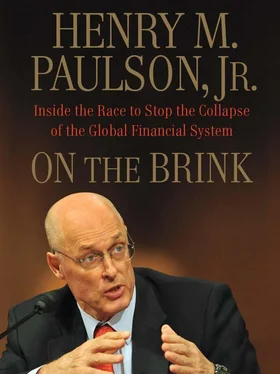Wachovia, however, was so large, and the system so fragile, that I knew the time had come, and I made this very clear. Josh replied that the administration was not afraid to make big decisions.
Before I went to bed, I had instructed my Treasury team to call me about a Wachovia deal regardless of the hour. I fell asleep without receiving news and awoke in the middle of the night, worried because I still hadn’t heard anything. I spoke to my team the next morning, and what they told me took my breath away.
I had assumed Wells Fargo would be the buyer, but on Sunday it decided not to make an offer. Early that evening the government concluded it should invoke the systemic risk exception. Because I wasn’t at Treasury, it fell to David Nason to get the president’s approval to take this action for Wachovia, and at 11:00 p.m. David called Josh Bolten to do so.
The FDIC told Wachovia it was going to use its powers to provide open bank assistance and invited proposals from Citigroup and Wells. As it turned out, everyone was up all night as Sheila Bair went back and forth trying to get the Federal Reserve or Treasury to bear the risk of any losses resulting from any government assistance. Treasury staff carefully questioned the FDIC’s assumptions in a series of conference calls. Wells finally came back in the wee hours with a very unattractive offer. By 4:00 a.m. FDIC staff concluded they expected no loss to the government under Citi’s proposal. That ended the debate on loss sharing between government entities, and Sheila agreed to accept Citi’s offer.
Monday, September 29, 2008
Early Monday morning, September 29, the FDIC announced that Citigroup would acquire Wachovia. All depositors would be protected. But unlike with the WaMu failure, all creditors would also be protected, a hugely important step that signaled to the markets the government’s willingness to support our systemically important banks.
Under the terms of its complicated offer, Citi would pay $2.16 billion in stock and assume $53 billion of Wachovia’s senior and subordinated debt. Wachovia would be split up, with its money management and stock brokerage arms left to shareholders in a stub company still called Wachovia. Citi would acquire the commercial and retail banking businesses and agree to absorb up to $42 billion in losses from Wachovia’s $312 billion pool of loans. The FDIC would guarantee any remaining losses. In exchange, the FDIC would get $12 billion in Citigroup preferred stock and warrants, giving it a way to potentially recoup money for its fund.
Although the FDIC emphasized in a statement that Wachovia had not failed, the truth was that without intervention the big bank certainly would have collapsed. Many in Congress, however, didn’t understand how precarious the situation was. All weekend as we had negotiated the fine points of TARP on the Hill, I had warned that another huge bank was about to go down. Now, even as we struggled to get $700 billion for the entire financial system, the FDIC had guaranteed nearly $300 billion worth of assets for one bank and no one had blinked an eye. We said, “It’s urgent we get TARP—look at Wachovia,” and they said, “Wachovia was just acquired.” They didn’t seem to get it.
The news that poured out of the Markets Room on Monday about Europe’s hard-pressed institutions proved unrelentingly bad. The U.K. seized lender Bradford & Bingley and sold most of it to Banco Santander, while giant Hypo Real Estate, Germany’s number two commercial real estate lender, received a 35 billion-euro ($50 billion) guarantee from the government and a group of private banks. These actions followed Sunday’s 11.2 billion-euro ($16.3 billion) bailout of the Belgian financial services firm Fortis by the governments of Belgium, Luxembourg, and the Netherlands.
European stocks dove, while credit markets deteriorated further. LIBOR-OIS spreads climbed to record levels. Banks continued to be afraid to deal with one another—a sure sign of panic.
Throughout the morning, I spoke with members of Congress who voiced their support for TARP while raising their own specific concerns. Maxine Waters, the Democratic congresswoman from California, called to push for minority hiring and to get reassurance that we would do something about foreclosures. I told her we would. “That’s good,” she replied, “because I’m going to vote for it. And if you don’t come through, my ass is grass.”
Despite the positive calls, I was getting reports that the bill wouldn’t pass. House Minority Whip Roy Blunt warned me that he didn’t have enough Republicans on board. Minutes before the vote started, Josh Bolten and Joel Kaplan told me that they weren’t optimistic, either. We could only hope for the best.
When the voting began, I was shut in my office with Michele Davis and on the phone with Russian finance minister Alexei Kudrin. It was an odd time for a call, but Russia was an important investor in U.S. and GSE debt, and I knew I needed to assuage Kudrin’s fears. He said he was starting to see signs that the banking crisis was spreading to Russia from Europe, and I could tell that his problems were much bigger than he was letting on. He was concerned about Friday’s run on Wachovia and our rescue of the bank, and wanted to know more about TARP. He wasn’t alone. Earlier I had spoken with Jean-Claude Trichet at the European Central Bank, and Saudi Arabian finance minister Ibrahim al-Assaf. Everyone hoped Congress would pass TARP to restore confidence. When I got off the phone, Michele started to prepare me for a postgame victory lap with the press.
“When this is done,” she said, “you’re going to need to walk out there and give a clear-eyed statement where you thank Congress for giving you this. You are going to need to emphasize that this isn’t just about buying illiquid assets. This is about market confidence. Don’t talk about mechanics.”
I nodded. My key advisers came in and out of the office as the total of negative votes kept rising. Michele and Jim Wilkinson assured me that the nays usually went first, while the yeas held back. But the roll was called quickly, and well before 2:00 p.m. the nays had passed the 218 total that meant defeat. Michele told me not to worry: “The whips will get people to reverse themselves.”
As the voting went on, Obama called to say, bluntly: “Hank, you’re going down. Your guys aren’t doing it. Your Republicans aren’t doing what they’re supposed to do.”
I had never heard him sound so partisan.
“We need more Democrats,” I said.
“From what I hear, there are only a few more. Even if I give you six or seven, it won’t be enough.”
It surprised me to hear Obama, normally calm and cool, sounding as agitated as I felt at that moment.
Next, I spoke with McCain, who said, “I’m doing everything I know how.”
In the end, of course, TARP was voted down, by a margin of 228–205. Pelosi phoned to deliver the bad news, blaming the defeat on the Republicans, who didn’t want to approve anything that looked like a bailout. Two-thirds of them had voted against TARP, compared with 40 percent of the Democrats. Republican leaders, including Boehner, blamed Pelosi for driving away GOP votes with a floor speech that had denounced the Bush administration’s “right-wing ideology of anything goes.” There was plenty of blame to go around, and neither side, unfortunately, fully understood the consequences of failure.
The camera crews waiting in the Media Room to conduct interviews with me were sent away. Instead, accompanied by Michele Davis and Jim Wilkinson, I walked over to the White House for a meeting with the president, the vice president, and key advisers. On the way, I called Roy Blunt to thank him for everything he had done. He was disappointed but said he wasn’t going to give up; he was confident we could eventually get the votes. So was I, but nonetheless, it was a devastating defeat.
Читать дальше












